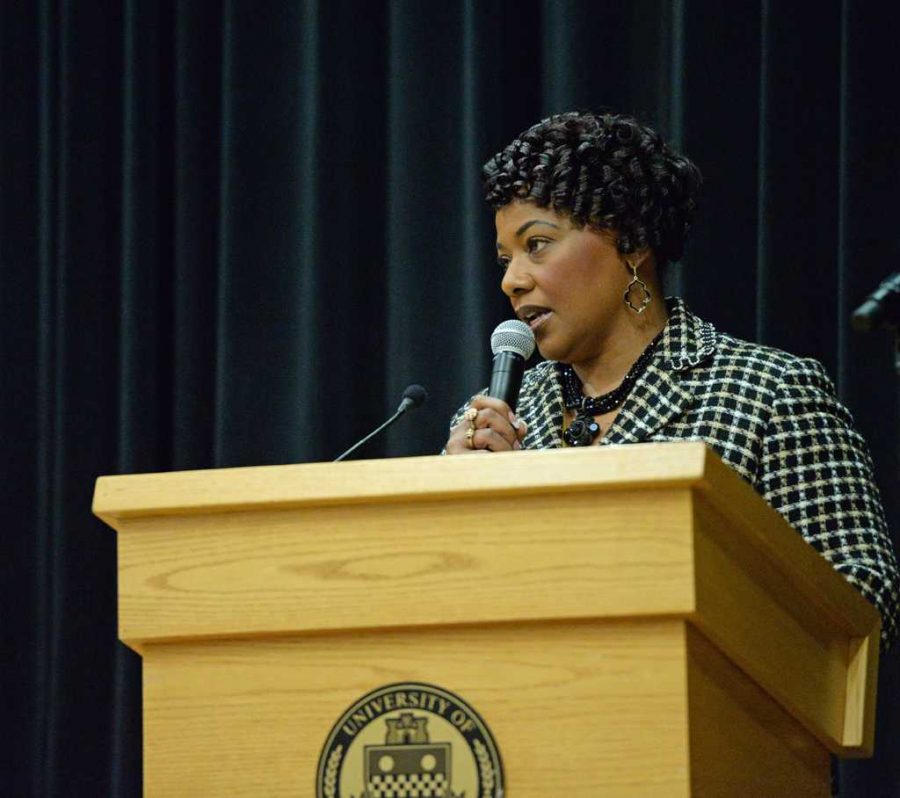Martin Luther King Jr.’s life may have been cut short by an assassin’s bullet almost 48 years ago, but his youngest daughter has picked up his fight for equality.
On Friday, Bernice King, carrying on her father’s beliefs and legacy, brought that fight to Pitt.
Bernice King, one of Martin Luther King Jr.’s four children, addressed the ongoing struggle for equality for minority people at a time when both students and administrators have said Pitt needs to work to make campus more diverse and inclusive. Pitt’s Black Action Society invited King to campus to commemorate Black History Month. The lecture was standing-room only, as more than 300 people packed into the O’Hara Student Center ballroom.
King focused her speech on the difference between equity — being fair and impartial — and equality — being equal. King said even though two people might receive the same treatment, those two people won’t necessarily be equal because they may start out in different positions.
As an example, King asked three Pitt students — one short, one tall and one of average height — to stand on the stage. She explained that, even if every student grew the same number of inches, they wouldn’t be the same height because they all started out at different heights. The shorter students would be at a disadvantage to the taller student, she said.
“Everybody’s not starting off at the same place,” she said, referring to class and economic privilege, sex privilege, citizenship privilege and nationalist privilege.
“There are many kinds of privilege,” King said. “Race is just one.”
King gave many examples of institutionalized racism — even in illegal drug sentencing — black Americans have faced over the years.
“There was a time when the person who used cocaine got less of a sentence than the person who used crack cocaine,” she said. “They may be using a different version, but it’s the same thing. You got a greater sentence because you could not afford the other drug.”
King said that one of the crowning accomplishments of her father’s movement was that it “did away with de jure discrimination,” the type of discrimination that U.S. law used to enforce, like the Jim Crow laws. De facto discrimination, however, the type of discrimination that happens because of a person’s opinions and actions, still persists.
As she acknowledged that reality to the audience, her voice cracked with emotion.
“We can’t just sweep [these issues] under the rug anymore,” she said.
During a question and answer session after her 50-minute speech, a student asked King if there was any particular change she would make to the U.S. education system.
King said the United States needs to tailor education more to each individual student and their particular strengths and weaknesses. She mentioned that her father scored in the lowest one-third of a percentile on his GRE, and said that America needs to move away from its “one-size-fits-all” educational system.
After King’s speech, Charisse Pearson-Bey, Pitt senior marketing major and Black Action Society member, called King’s talk amazing and said that she enjoyed King’s approach of “here are the problems … but I have solutions.” She believes that she and everyone else at the talk was “making history by being [there].”
Gabrielle Wynn, the president of Pitt’s Black Action Society, called the speech a “great mashup of current events and history” and said King “challenged all of us to work within our own communities to make change happen.”
“What better way to kick Black History Month off than by inviting a relation to a civil rights hero and legend — and someone who is an inspiration in her own right?” Wynn said.
She said Pitt’s hiring of Pamela Connelly as associate vice chancellor for diversity and inclusion in May 2015 is a “huge step in the right direction” and that mandatory diversity programs for first-year students “show incoming students that diversity is important,” but that overall, Pitt could do a better job of recognizing minority interests.
Jacky Chen, a member of the Student Government Board and the Hail to Diversity coalition, said Pitt’s diversity programs are a start, but they haven’t had much of a real effect yet.
Despite the formation of a diversity inclusion task force, among other programs, Chen, a Pitt junior neuroscience major, said he “[doesn’t] think diversity has improved too much.”
Currently, Pitt’s undergraduate student population is 74.3 percent white and only 4.9 percent black, according to Pitt’s 2016 Fact Book.
“We as a University are not diverse at all,” he said. “It takes away from the student experience when you aren’t able to make friends with people who don’t share the same beliefs as you.”
Above all, King impressed upon her audience the importance that people give each other fair opportunity to succeed, regardless of their racial, cultural or economic background.
“Regardless of our barriers, regardless of our differences … [we need to] create a true global humanity, where all of God’s children have the opportunity to live to their highest, total, full potential.”



